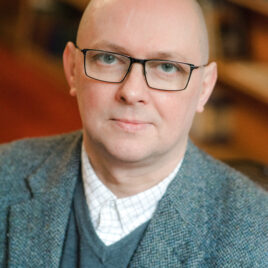Kenneth Gibb: Next steps for University of Glasgow and CaCHE homelessness initiative

Professor Kenneth Gibb
Professor Kenneth Gibb, director of the UK Collaborative Centre for Housing Evidence (CaCHE) and co-lead for the University of Glasgow homelessness initiative, discusses the ways in which these two organisations hope to make a positive impact on those experiencing homelessness.
In May 2021 it was announced that as the civic part of the University of Glasgow’s new strategy, it would support a programme of work focused on the issue of homelessness, specifically, reducing homelessness in Glasgow. The problem and nature, and indeed the response to homelessness, is multifaceted and complex. This initiative will need to embrace these different dimensions if it is to make a serious difference and we can assure you that it is our intention to do exactly that.
We hope that through our range of academic expertise, contacts and networks, in addition to our physical and financial resources, we will be able to make a positive impact.
I am pleased to announce that since we launched this initiative in May, we have made progress and are now moving into an operational phase. In this short blog, I have set out what we have planned over the coming months.
When we first introduced the initiative, we proposed several strands of work: examining how we can best support volunteering by students, staff and the wider University community, recognising that there is already impressive volunteering work carried out across the University and we are keen not to interfere with or displace important activities that are already underway.
Second, we recognise that teaching and education can play an important role in evolving the partnerships that already exist within the University in areas that touch on homelessness responses and local services, for instance, education, medicine and public health, justice and the law, as well as a whole range of expertise in housing, management and the social sciences.
Third, we wish to investigate ways in which we can bring research skills and value to homelessness questions specific to Glasgow. Furthermore, finally, we recognise that the University possesses assets in addition to its academic value that may be of use. A longer-term question is whether some of our physical assets may play a role in contributing to combatting homelessness.
This remains our broad agenda. However, we are constructing a sounding board or reference group which will help us focus and prioritise the early phases of our work. To that end, we are pleased to report that we now have a dedicated member of staff, Caragh Keith, who is working with me and with colleagues in the UK Collaborative Centre for Housing Evidence (CaCHE) to support this homelessness initiative.
So far, we have received a lot of enquiries from people who are interested in getting involved in this work. We will be shortly contacting everybody who reached out to let them know how they can get involved. We’ll also keep the wider community up to date on progress through the University of Glasgow and CaCHE social media channels and websites.
Over the coming months, our immediate priorities are:
- Establishing a small sounding board with whom we will discuss our plans in more detail
- Conducting a small short life research project scoping out the homelessness initiative, its context and the nature of the homelessness policy and practice system of delivering services across the greater Glasgow area.
- Continuing our discussions with colleagues and supporters within the University but also across the wider homelessness professional communities, in order to ensure that we develop a truly useful, inclusive and genuinely additional contribution.
- Hosting a launch event and public lecture on campus in the spring. We are delighted that Professor Suzanne Fitzpatrick (Heriot-Watt University) will be the main speaker.
Finally, we recognise that we have no monopoly of wisdom, far from it, regarding these questions. And it is great that there are so many experts across the University who can guide us in the work ahead. We are very conscious of the fact that we need to take people both inside and outside of the University with this, and we would welcome any advice, support or willingness to help that you may wish to offer.
This article was originally published on the CaCHE website.









